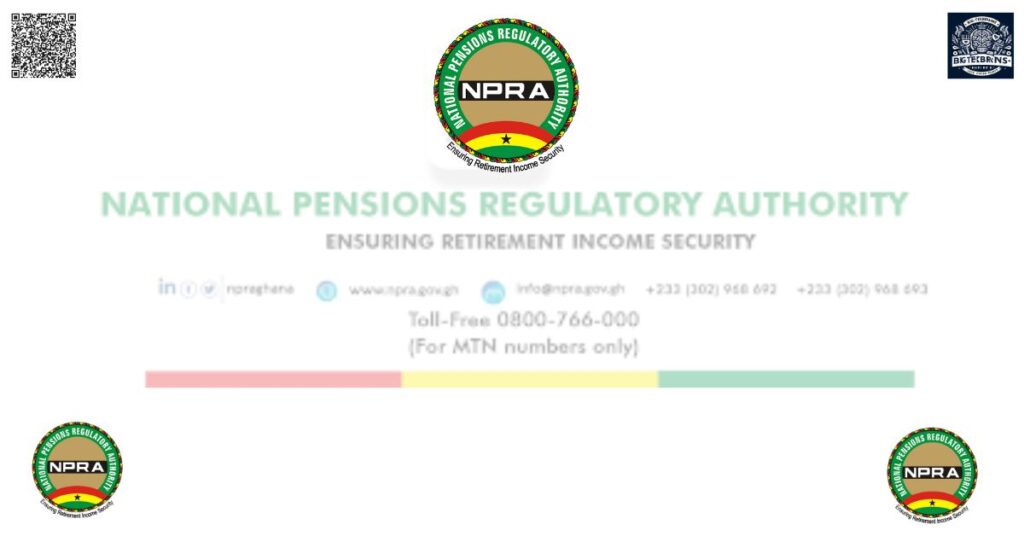Introduction
The National Pensions Regulatory Authority (NPRA) is the regulatory body responsible for overseeing pension schemes in Ghana. Established to ensure the effective administration and sustainability of pension funds, NPRA plays a crucial role in safeguarding the retirement benefits of workers. This article provides an in-depth look at the NPRA, including its historical background, constitutional mandate, organizational structure, leadership, recruitment process, and notable achievements.
Historical Background
The NPRA was established under the National Pensions Act, 2008 (Act 766), which introduced a three-tier pension scheme to replace the previous Social Security and National Insurance Trust (SSNIT) system. The Act was part of Ghana’s pension reform efforts aimed at improving retirement income security, expanding pension coverage, and ensuring better management of pension funds.
Constitutional Role and Mandate
The NPRA derives its mandate from the National Pensions Act, 2008 (Act 766) and is tasked with:
- Regulating and monitoring pension schemes in Ghana.
- Ensuring compliance with pension regulations and standards.
- Licensing trustees, fund managers, and custodians who operate within the pension industry.
- Protecting the interest of pension contributors and beneficiaries.
- Educating the public on pension-related matters.
- Promoting the development of pension schemes that provide retirement income security.
Organizational Structure
The NPRA operates under a structured system that ensures efficiency in regulating the pension sector. The key units within the authority include:
Board of Directors:
- Provides strategic oversight and policy direction.
Chief Executive Officer (CEO):
- Responsible for day-to-day administration.
Regulatory Compliance Department:
- Ensures adherence to pension laws and guidelines.
Licensing and Registration Unit:
- Handles the accreditation of pension service providers.
Finance and Administration Department:
- Manages financial operations and administrative functions
Public Affairs and Education Unit:
- Engages in public sensitization and awareness campaigns.
Research and Development Unit:
- Conducts studies to enhance pension policy reforms.
Leadership and Ranks
The leadership hierarchy of the NPRA includes:
- Board Chairman – Oversees the policy direction of the Authority.
- Chief Executive Officer (CEO) – Leads the executive management team.
- Directors of Key Departments – Responsible for different regulatory and operational functions.
- Managers and Unit Heads – Supervise specific operational aspects.
- Senior and Junior Officers – Execute the daily regulatory and administrative duties.
Mode of Appointment or Recruitment
Appointments to the NPRA follow a structured approach:
- The Board of Directors is appointed by the President of Ghana, subject to parliamentary approval.
- The CEO is appointed by the President upon recommendation by the Board.
- Other key executives and staff members are recruited through competitive selection processes based on qualifications, experience, and expertise in finance, law, administration, and pensions management.
Offices and Units That Work With or Under NPRA
The NPRA collaborates with several entities to fulfill its mandate, including:
Social Security and National Insurance Trust (SSNIT)
- Manages the first-tier pension scheme.
Pension Fund Trustees and Administrators
- Ensure efficient pension fund management.
Ministry of Employment and Labour Relations
- Provides policy direction on labor and pension matters.
Ghana Revenue Authority (GRA)
- Ensures tax compliance on pension contributions.
Financial Institutions and Fund Managers
- Handle investments of pension contributions.
Constitutional Reforms and Legislative Amendments
Since its establishment, the NPRA has undergone various reforms to strengthen Ghana’s pension system. Some of these include:
- Amendments to Act 766 to enhance pension benefits and improve fund management.
- Expansion of pension coverage to include informal sector workers.
- Introduction of policies to enhance transparency in pension administration.
Achievements and Impact
The NPRA has made significant strides in Ghana’s pension sector, including:
- Successfully implementing the three-tier pension scheme.
- Expanding pension coverage to informal sector workers.
- Enhancing transparency and accountability in pension fund management.
- Educating the public on pension rights and obligations.
- Strengthening regulatory compliance among pension service providers.
References
- National Pensions Act, 2008 (Act 766)
- NPRA Official Website (https://npra.gov.gh)
- Ministry of Employment and Labour Relations Reports
- Ghana Statistical Service Pension Reports

